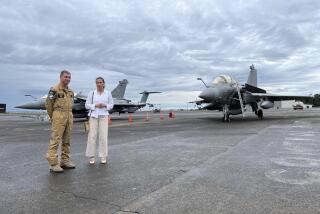French Carrier Joins U.S., British Force in Balkans
- Share via
PARIS — Facing increasing public concern over the mounting body count of French soldiers serving with United Nations forces in the Yugoslav crisis, President Francois Mitterrand on Tuesday ordered a French aircraft carrier to join British and American vessels in the Adriatic Sea with a goal of protecting the vulnerable peacekeeping forces.
Mitterrand’s decision to send the 32,780-ton carrier Clemenceau, which can carry up to 40 warplanes, was announced Tuesday morning by Pierre Joxe, the French defense minister.
Joxe did not elaborate on the ship’s mission except to say that it will provide “options which we haven’t had up till now.”
In another sign that the international military presence in the region may be taking a more aggressive turn as peace talks continue to bog down in Geneva, Joxe also announced the deployment of additional French artillery batteries.
The military moves came in an atmosphere of souring political support for the passive French role in the conflict. In the French press, the Yugoslav situation increasingly is being portrayed as having the makings of a quagmire.
Counting two French soldiers killed by Croatian forces Monday in the disputed enclave of Krajina, 11 French soldiers have died in the past year, more than those from any other country. In all, 23 U.N. soldiers have died in the Yugoslav conflict. Eighty French soldiers have also been wounded.
With 4,900 troops on the ground, France has more troops at risk in the Balkans than any other Western power, and it is the first to face the body-count phenomenon familiar to Americans from the Vietnam War.
After the two most recent deaths, newspaper columnists argued that the French troops are becoming targets in a U.N. mission that lacks clear objectives and limits their ability to respond.
Earlier this month, French forces in Sarajevo suffered another embarrassing setback when Bosnian Deputy Prime Minister Hakija Turajlic was assassinated by Serbian militiamen while he was in the protective custody of the French troops near the Sarajevo airport.
Philippe Morillon, a decorated French general who is commander of U.N. forces in Sarajevo, took personal responsibility for the Jan. 8 assassination.
With parliamentary elections set for March, the toll of French soldiers in the Yugoslav warfare has already emerged as a political issue, particularly among nationalist politicians who object to placing French forces under overall U.N. command.
Opposition politician Jacques Baumel, a member of Parliament with the neo-Gaullist Rally for the Republic party, called for the “immediate withdrawal from the combat zone of French units, which, paralyzed in their actions and impotent to stop the fighting, find themselves unnecessarily exposed to the worst dangers.”
Reflecting the gloomy public view of the conflict, the popular afternoon newspaper France Soir on Tuesday displayed a banner headline: “Stop the Massacre of the Blue Berets!”
Meantime in the Balkans on Tuesday, Croatian forces pressed on with their offensive to secure control of strategic Serbian-held territory--even after a reprimand from the U.N. Security Council.
Croatian President Franjo Tudjman offered to halt the five-day offensive and withdraw Croatian army units from the region if Serbian militia handed over their heavy artillery seized from U.N.-supervised arms depots in Croatia’s four peacekeeping zones.
“We must install civilian power and normalize life in the region,” the Croatian news agency HINA quoted Tudjman as saying. “Our military forces will withdraw from the regions they have liberated, insofar as the Serb paramilitary forces are disarmed and give up the heavy weapons they seized.”
Tudjman also said Croatian police will replace all military forces in the region, a move that would be fiercely opposed by Serbian militias who since last year have refused to disband under the year-old U.N. peace plan.
Clashes between Serbs and Croats were apparently confined to the area around the vital Maslenica Bridge, which joins Croatia’s heartland with the southern Dalmatian coast. Fighting continued in Grace, Divljane and Karin Placa, villages east of Zadar, said U.N. spokeswoman Shannon Boyd.
But Boyd cited “disturbing reports of unusual Croat troop movements” south of Knin, the center of Krajina, outside the 65-mile confrontation line.
Western diplomats fear that the fighting in the disputed Serbian enclave of Krajina could spread into a wider conflict engulfing the former Yugoslav federation.
At least 10,000 people were killed in 1991 when Serbs, backed by the Yugoslav army, took up arms against Croatian independence.
A U.N. cease-fire last January froze the Serb-Croat conflict, although the Croatian government has been increasingly frustrated over Krajina’s Serbs and the United Nations’ inability to disarm their militias. The Serbs’ self-proclaimed state has virtually severed the republic in two.
The Security Council on Monday condemned Croatian attacks on Serbian-held territory in the U.N. zone and demanded that Serbs return heavy weapons to U.N. supervision.
With the Croatian army in control of the damaged Maslenica Bridge since Monday, Serbs in Belgrade, the Serbian and federal capital, continued to sign up to fight to defend Krajina. The so-called republic stretches from the Dalmatian hinterland and covers almost one-third of Croatia. A Krajina spokesman said 1,000 volunteers have headed off to the war zone in buses furnished by two state enterprises.
Times staff writer Tempest reported from Paris. Times special correspondent Silber reported from Belgrade.
More to Read
Sign up for Essential California
The most important California stories and recommendations in your inbox every morning.
You may occasionally receive promotional content from the Los Angeles Times.













